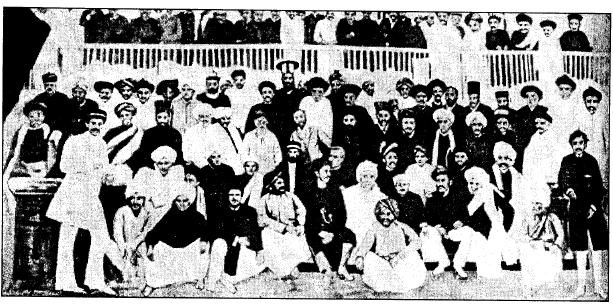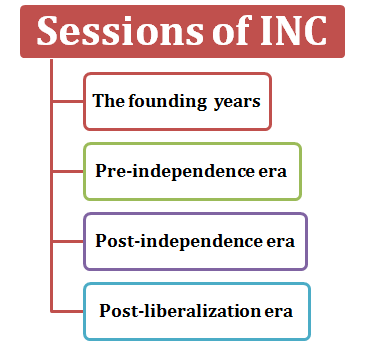

Indian National Congress (INC) was established in 1885 with the active participation of Allan Octavian Hume and some other leaders. In pre-independence India, INC was considered one of the most influential political parties. The upliftment of lower classes of Indian citizens and the promotion of basic education among Indians were key working areas of INC. Indian society’s underprivileged sections were a focus area of INC.

Indian National Congress Group Convention 1885
©Multiple Authors Goa University, CC BY-SA 3.0
INC was established as a Pan-India organization to spread awareness regarding Indian political rights and colonial policies that are exploitative. A key objective of INC was to successfully promote national unity (Kumar, 2022). The demolition of the British rule’s base in India was another aim and a key objective of INC that helps in rising awareness among young Indians against British rule.
The establishment of INC is often considered the first and most influential modern nationalist movement in India. This movement helped in emerging the entire British Empire in Africa and Asia. INC was first established in 1885 as a comprising organization with educated elite persons of India to communicate and transfer key thinking of the British to the common Indians (Amin, 2022). INC is referred to as Congress Party and in many subsequent years, different sessions of INC were held in different places.
All the session of INC is divided into four different segments that are namely, the founding years, the era of pre-independence, the post-independence era and the post-liberalization era.

Four types of sessions of INC
A detailed understanding of each of these types of sessions is helpful in understanding the role of these sessions in Indian history.
| Time of the sessions | Places | Presidents | Important information |
|---|---|---|---|
| 1885 (December) | Bombay | W C Banerjee | The very first session with 72 delegates led to the spread of awareness regarding the motive of INC. |
| 1886 (December) | Calcutta | Dadabhai Naoroji | It is the next and second session. |
| 1887 (December) | Madras (indianexpress, 2022) | Badruddin Tyabji (first Muslim president) | The third session |
| 1888 (December) | Allahabad | George Yule (first English president) | The fourth session |
| 1889 (December) | Bombay | Sir William Wedderburn | - |
| 1890 (December) | Calcutta | Feroz Shah Mehta | - |
| 1891 (November) | Nagpur | P. Ananda Charlu | - |
| 1892 (December) | Allahabad | W C Banerjee | - |
| 1893 (December) | Lahore | Dadabhai Naoroji | - |
| 1894 (November) | Madras | Alfred Webb | - |
| 1895 (-) | Poona | Surendranath Banerjee | - |
| 1896 (December) | Calcutta | Rahimatullah M. Sayani | The national song “Vande Mataram” was first sung by Rabindranath Tagore. |
| 1897 (October) | Amravati | C. Sankaran Nair | - |
| 1898 (November) | Madras | Ananda Mohan Bose | - |
| 1899 (December) | Lucknow | Romesh Chunder Dutt | The proposition of land revenue’s permanent fixation was submitted |
| 1901 (December) | Calcutta | Dinshaw Eduljee Wacha | |
| 1905 (December) | Banaras | Gopal Krishna Gokhale | Swadeshi movement’s official announcement was made |
| 1906 (December) | Calcutta (inc, 2022) | Dadabhai Naoroji | For most important resolutions regarding Swaraj, national education, swadeshi and boycott movement were adapted. |
| 1907 (December) | Surat | Rash Behari Ghosh | Congress was divided into moderates and extremists and this session was adjourned. |
| 1910 (December) | Allahabad | Sir William Wedderburn | The act of 1909 was introduced by M.A Jinnah that depicts the electorate system. |
| 1911 (December) | Calcutta | B. N. Dhar | Recitation of “Jana- Gana-Mana” for the first time. |
| 1915 (December) | Bombay | Sir S.P. Sinha | Modification of congress to ensure an extremist. |
| 1916 (December) | Lucknow | A.C. Majumdar | Reunion of two divisions of congress Lucknow pact was signed by Muslim League and Congress together. |
| 1917 (December) | Calcutta | Annie Besant | - |
| 1918 (August) | Bombay | Romesh Chunder Dutt | - |
| 1918 (December) | Delhi | Madan Mohan Malaviya | - |
| 1920 (December) | Nagpur | C.Vijayraghavachariar | - |
| 1922 (December) | Gaya | Deshbandhu Chittaranjan Das | - |
| 1924 (December) | Belgaum | M.K. Gandhi | - |
| 1925 (April) | Kanpur | Mrs Sarojini Naidu | - |
| 1927 (December) | Madras | M.A. Ansari | - |
| 1929 (April) | Lahore | Jawaharlal Nehru | - |
| 1931 (March) | Karachi | Sardar Vallabhai Patel | - |
| 1934 (October) | Bombay | Dr Rajendra Prasad | - |
| 1936 (June) | Lucknow | Jawaharlal Nehru | - |
| 1937 (July) | Faizpur | Jawaharlal Nehru | - |
| 1938 (February) | Haripura | Subhash Chandra Bose | - |
| 1939 (March) | Tripura | Subhash Chandra Bose | - |
| 1940 (March) | Ramgarh | Maulana Abul Kalam Azad | - |
| 1941-1945 | No such sessions | - | - |
| 1946 (November) | Meerut | J.B. Kripalani | - |
The three most important names in the history of INC are Edulji Wacha, Dadabhai Naoroji and Allan Octavian Hume. Indian Rebellion of the year 1857 was a tough and challenging situation for the British rulers as it was a face-to-face challenge for them from common Indians. This rebellion shook the base of British rule as after this India’s overall control was transferred to British Empire from the East India Company. A.O Hume, the then retired ICS officer, felt that the educated Indians should be united and have a strong political base. This thought of him led to the formation of INC in future. Overall development and growth of Indian culture, educational sector and social attributes were important concerns of INC.
Q1. What is the core significance of INC for a developing India?
Ans. At the time of independence in 1947, suitable and strong political support from a political party was very much needed. INC became the most dominant and supporting political party of the then newly independent India.
Q2. Where was the fourth session of INC held and who was the president of the session?
Ans. In the year 1888, the fourth session of INC was held in Allahabad. The president of this session was George Yule who takes an active part in this session.
Q3. What was the motto of INC?
Ans. Proper organization of public opinion and ensuring a supporting educated Indian base were the most required things for a continuous British rule in India. Therefore, INC was established and its key motto was “Ab Hoga Nyay”. This motto was fully followed by the leaders of this party in every possible way.